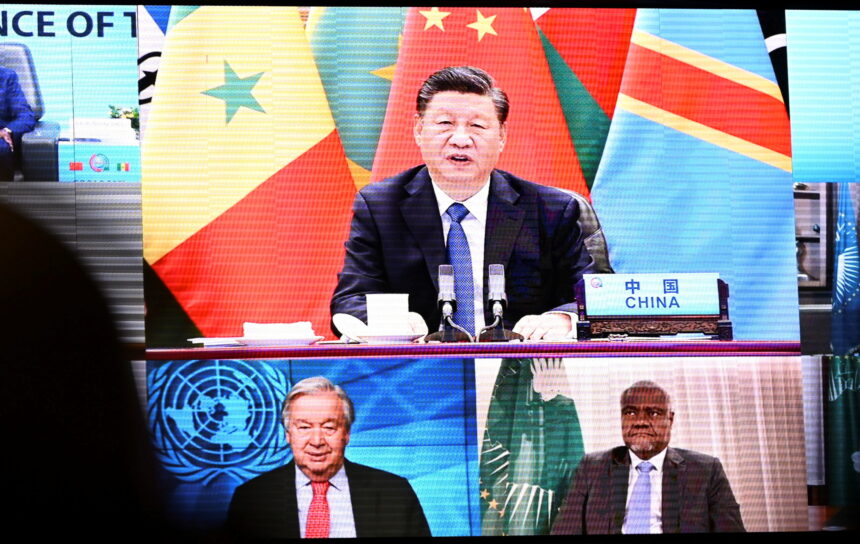This paper issued by the Atlantic Council discusses Xi Jinping’s goal of forging alliances with nations in the Global South to foster a collective front against the hegemony of the United States. Xi aims to create an alliance that challenges the current international system, led by the United States, by implementing initiatives like the Belt and Road Initiative and the BRICS.
Due to Russia’s incursion into Ukraine, China has adjusted its strategy to enhance its alliances with countries that share similar geopolitical objectives. This approach may perhaps dissuade certain nations in the Global South who highly value their links with the United States of America.
Chinese President Xi Jinping will chair the Forum on China-Africa Cooperation on September 4. The main goal of the Forum is to enhance connections with nations situated in the Global South. Beijing is actively pursuing diplomatic, commercial, and business ties in the region, and this event is part of those endeavours. Xi’s viewpoint on the developing world has changed in recent years due to his exclusive focus on the geopolitical battle with the United States and its allies.
Xi’s strategy aims to advance China’s political, economic, and ideological objectives by uniting states from the Global South in opposition to the United States’ global alliance structure. Beijing’s relationships with South Asian countries, its position in the global system, and the course of its influence worldwide will undergo substantial changes as a consequence of this development.
Xi’s diplomatic approach, particularly his stance towards nations in the Global South, greatly influences many of the domestic and international policy objectives he pursues. Several strategic endeavours, such as China’s Belt and Road Initiative (BRI), the Shanghai Cooperation Organization (SCO), and various other initiatives, are being pursued to bolster China’s economic stakes in emerging markets. These efforts aim to enhance trade, investment, and financing between China and nations in the Global South. Xi’s recent approach towards the United States and its allies has rendered his stance on Chinese policy more apparent and less contradictory.
Chinese President Xi Jinping is developing a more assertive foreign policy in order to weaken the United States of America and its global dominance. The author regards Russia as an indispensable ally in this undertaking because it offers a consistent energy supply and a vast market for Chinese goods. The alteration in foreign policy has significantly influenced Xi’s approach in the Global South, as he seeks to mobilize the leaders of those nations to support his efforts against the United States. Goldman Sachs played a key role in establishing the BRICS alliance of emerging economies. The corporation devised a plan that led to the development of this alliance. Membership has been granted to Egypt, Argentina, Iran, the oil-exporting Middle Eastern countries, Ethiopia, a nation experiencing extreme poverty, and Egypt itself. China is subject to the political or economic influence of all these countries. Undoubtedly, Xi carefully considers the loyalties of both the BRICS states and other countries while advancing the objectives of Chinese foreign policy. Beijing, the capital of China, believes that the BRICS nations should collaborate to promote the interests of China and the countries in the Global South.
China’s foreign policy is exerting pressure on relations with developing countries due to Beijing’s efforts to get Southern governments to align with its position against the United governments. The United States’ prospects of garnering the backing of emerging nations for the Global Security Initiative, expected to get official approval, may be jeopardized due to mounting pressure.
Most nations recognize the immense value of their relationships with the United States and are unwilling to sever connections, even if a small number of countries may align with Beijing’s objectives against the United States. Exerting pressure on governments in the Global South to oppose Washington could potentially alter the public’s opinion of China. Xi’s refusal to join a global alliance, proposed by the United States administration, to address the instability in the Red Sea caused by the Houthis has raised concerns among certain individuals. A more conscientious China’s involvement in the Middle East may face repercussions if it upsets important friends who are against the Houthis.
To counter China’s attempts to mobilize political leaders from developing countries against the current global system, Vice President Joe Biden’s administration should consider enlarging the G20 and creating additional institutional platforms to address conflicts between developed and developing nations. However, Washington must exercise caution in order to avoid conveying the idea that recognizing China’s concerns is a necessary condition for involvement in programs spearheaded by the United States.
Read the full article here.







